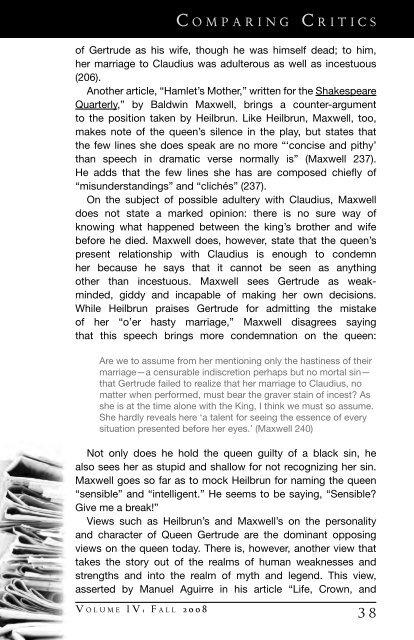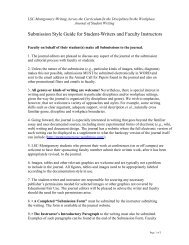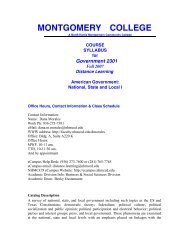2008 - Communication Across the Curriculum (CAC)
2008 - Communication Across the Curriculum (CAC)
2008 - Communication Across the Curriculum (CAC)
Create successful ePaper yourself
Turn your PDF publications into a flip-book with our unique Google optimized e-Paper software.
V o l u m e I V : F a l l 2 0 0 8<br />
C o m p a r i n g C r i t i c s<br />
of Gertrude as his wife, though he was himself dead; to him,<br />
her marriage to Claudius was adulterous as well as incestuous<br />
(206).<br />
Ano<strong>the</strong>r article, “Hamlet’s Mo<strong>the</strong>r,” written for <strong>the</strong> Shakespeare<br />
Quarterly,” by Baldwin Maxwell, brings a counter-argument<br />
to <strong>the</strong> position taken by Heilbrun. Like Heilbrun, Maxwell, too,<br />
makes note of <strong>the</strong> queen’s silence in <strong>the</strong> play, but states that<br />
<strong>the</strong> few lines she does speak are no more “‘concise and pithy’<br />
than speech in dramatic verse normally is” (Maxwell 237).<br />
He adds that <strong>the</strong> few lines she has are composed chiefly of<br />
“misunderstandings” and “clichés” (237).<br />
On <strong>the</strong> subject of possible adultery with Claudius, Maxwell<br />
does not state a marked opinion: <strong>the</strong>re is no sure way of<br />
knowing what happened between <strong>the</strong> king’s bro<strong>the</strong>r and wife<br />
before he died. Maxwell does, however, state that <strong>the</strong> queen’s<br />
present relationship with Claudius is enough to condemn<br />
her because he says that it cannot be seen as anything<br />
o<strong>the</strong>r than incestuous. Maxwell sees Gertrude as weakminded,<br />
giddy and incapable of making her own decisions.<br />
While Heilbrun praises Gertrude for admitting <strong>the</strong> mistake<br />
of her “o’er hasty marriage,” Maxwell disagrees saying<br />
that this speech brings more condemnation on <strong>the</strong> queen:<br />
Are we to assume from her mentioning only <strong>the</strong> hastiness of <strong>the</strong>ir<br />
marriage—a censurable indiscretion perhaps but no mortal sin—<br />
that Gertrude failed to realize that her marriage to Claudius, no<br />
matter when performed, must bear <strong>the</strong> graver stain of incest As<br />
she is at <strong>the</strong> time alone with <strong>the</strong> King, I think we must so assume.<br />
She hardly reveals here ‘a talent for seeing <strong>the</strong> essence of every<br />
situation presented before her eyes.’ (Maxwell 240)<br />
Not only does he hold <strong>the</strong> queen guilty of a black sin, he<br />
also sees her as stupid and shallow for not recognizing her sin.<br />
Maxwell goes so far as to mock Heilbrun for naming <strong>the</strong> queen<br />
“sensible” and “intelligent.” He seems to be saying, “Sensible<br />
Give me a break!”<br />
Views such as Heilbrun’s and Maxwell’s on <strong>the</strong> personality<br />
and character of Queen Gertrude are <strong>the</strong> dominant opposing<br />
views on <strong>the</strong> queen today. There is, however, ano<strong>the</strong>r view that<br />
takes <strong>the</strong> story out of <strong>the</strong> realms of human weaknesses and<br />
strengths and into <strong>the</strong> realm of myth and legend. This view,<br />
asserted by Manuel Aguirre in his article “Life, Crown, and<br />
3 8






